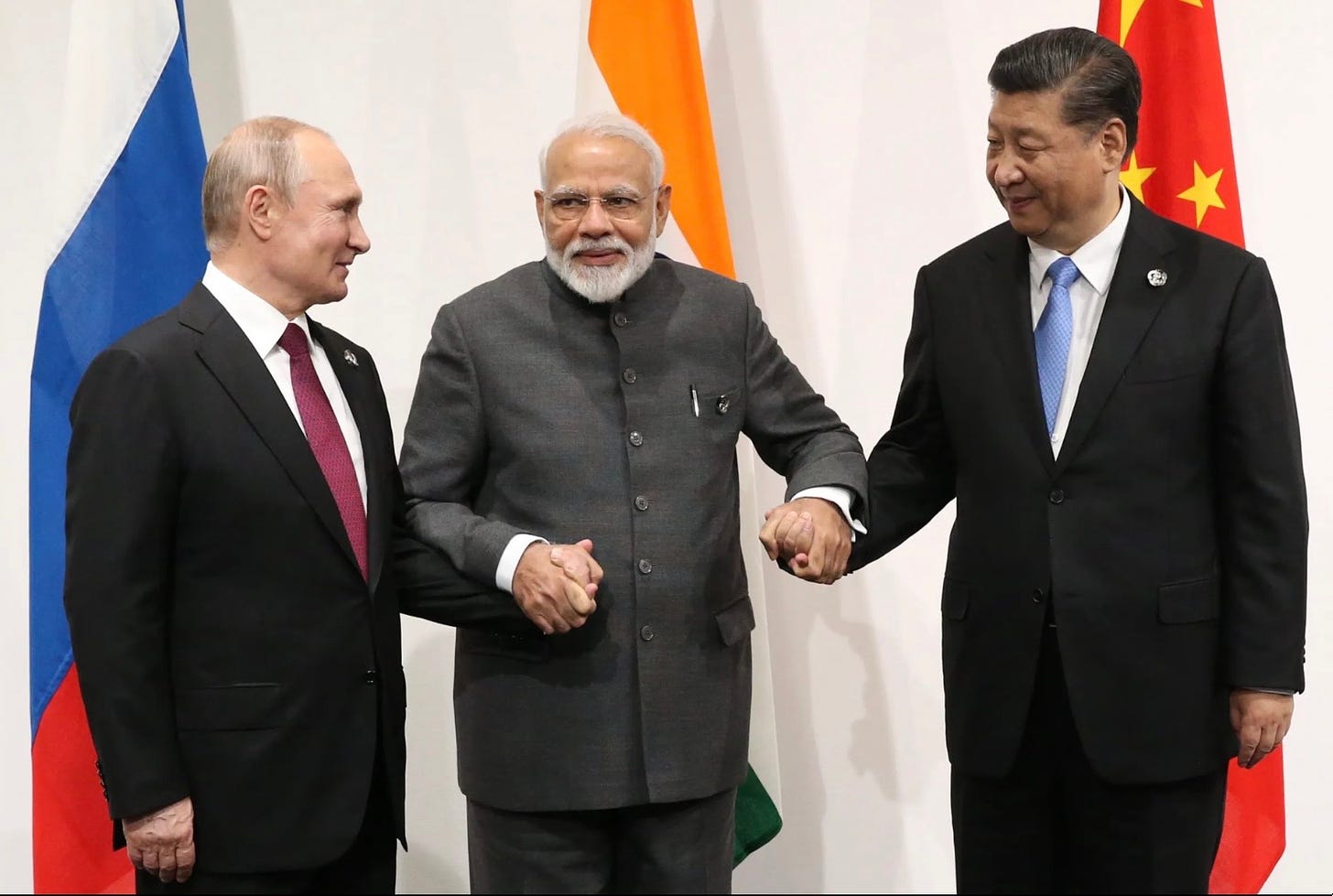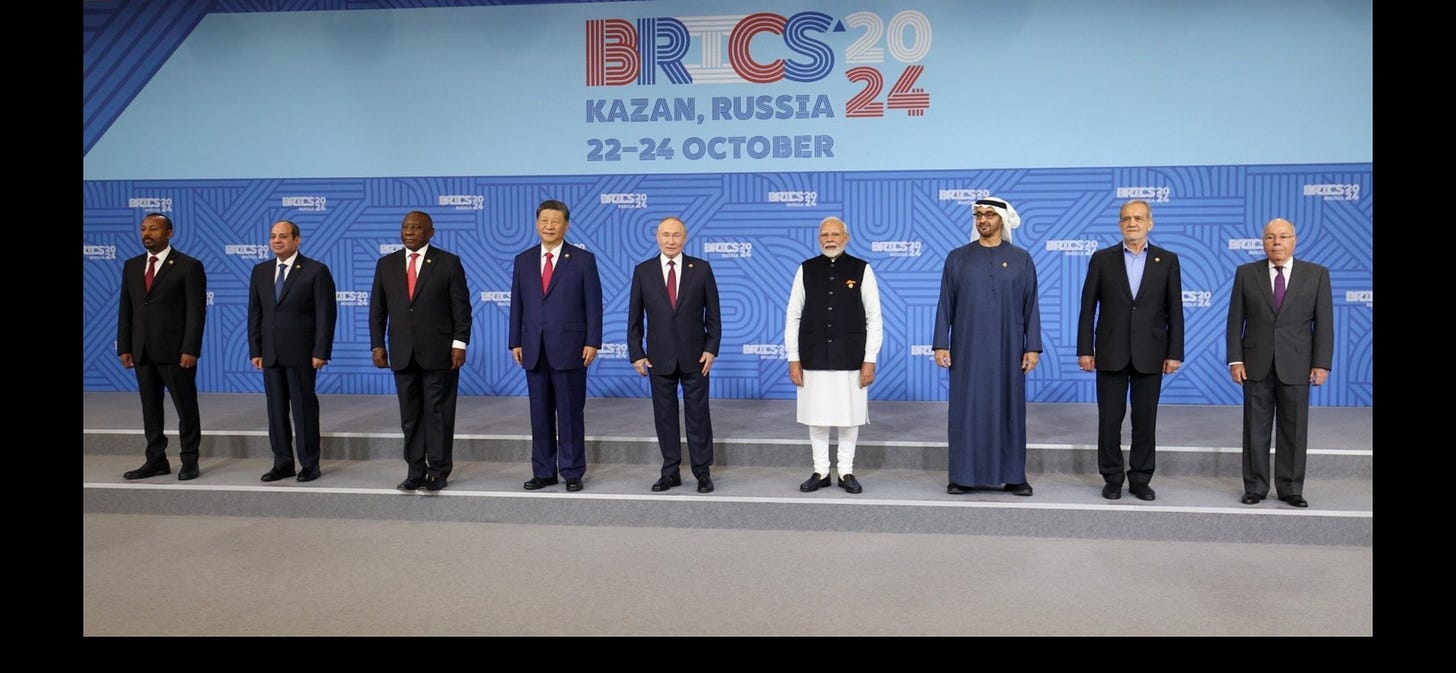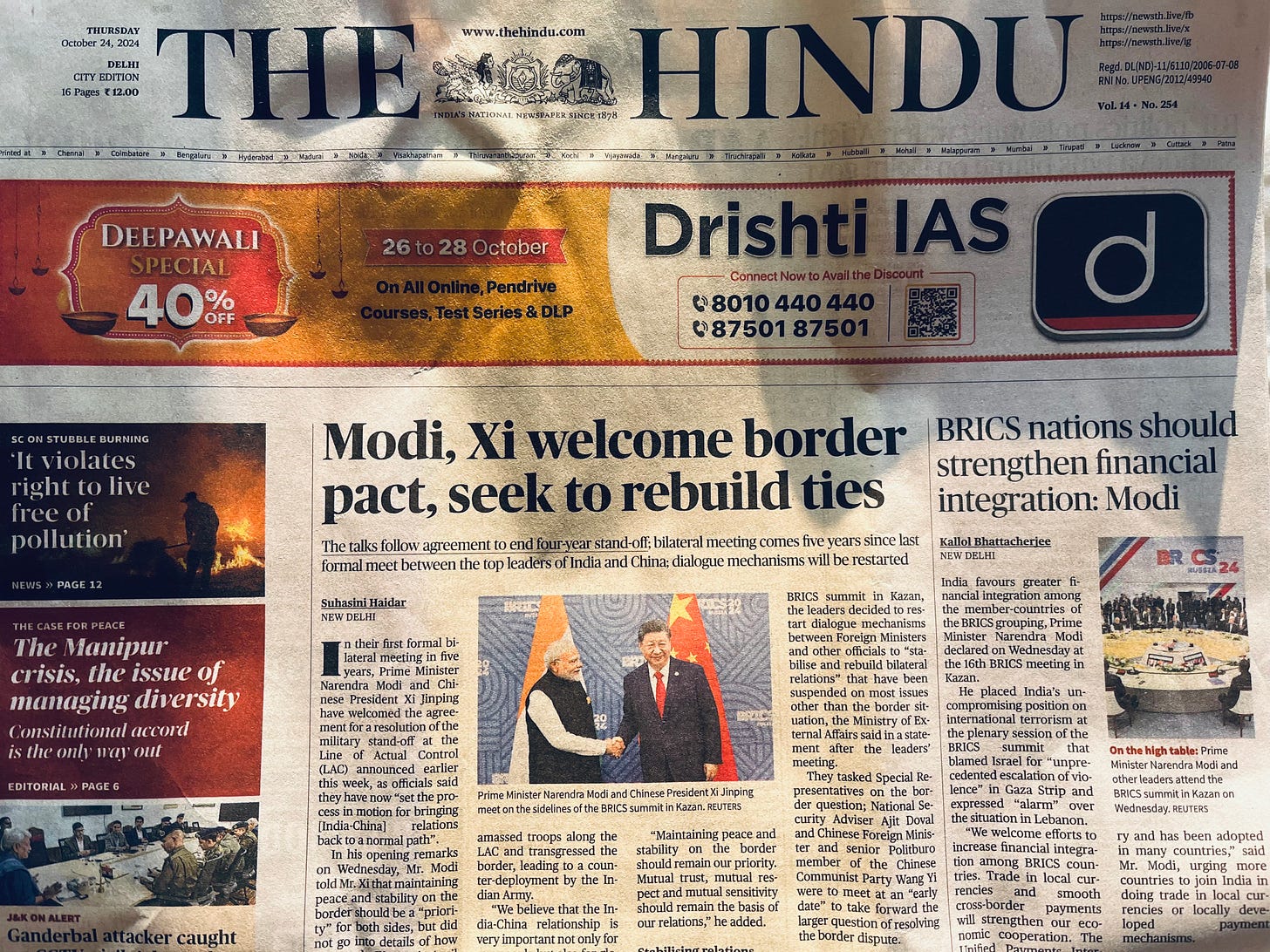Hardly covered by much of the Western media, leaders of some of the world’s biggest powers met in Kazan, Russia this week. Here’s what happened.
The phrase ‘bricking it’ is British slang for being extremely nervous or worried about something. Such as, "I'm absolutely bricking it about this test tomorrow". This seems appropriate for the subject at hand.
When Russia hosted this years BRICS summit of the leading non-Western emerging economies in the obscure city of Kazan, the responses were telling.
This was most awkward for portrayals of Russia as an isolated world power.
It is true that Putin didn’t personally travel to the last BRICS summit in Johannesburg, likely out of concern for the International Criminal Court arrest warrant, arising from him ordering the invasion of Ukraine.
This year the world handily came to his doorstep. Indian Prime Minister Modi and Chinese Premier Xi were not only happy to attend. But to also use the occasion of the Sunmit to herald a patching up of Chinese-Indian relations regarding their own border tensions.
Just look at the optics: of this very visual representation of Russia hitching itself onto the leading proponents of the ‘Asian Century’.
Who attended and who didn’t
The other notable fact of this 16th BRICS summit (yes, it’s been going on for that long) was it being the first to take place in an expanded format.
BRICS+ came into being this year when Ethiopia, Egypt, Iran and UAE joined. Saudi Arabia half-joined, but since its government is still chasing a defence deal with America, seems to have decided not to send a high-level representative to this years summit (perhaps also to avoid facing President Pezeshkian of Iran, who did attend).
And, rather interestingly, the list of countries wanting to join is long. Thailand and Malaysia for instance. “Thailand is willing to join the BRICS mechanism as soon as possible (and) play a more active role in South-South cooperation”, said its foreign minister.
And for Malaysia, so that it “can effectively voice any issue on the international stage because such a collective voice is more impactful than acting individually”, said its foreign minister.
There are now 13 ‘BRICS partner states’ - not members but interested parties sitting the antechamber of membership. Specificially:
Algeria
Belarus
Bolivia
Cuba
Indonesia
Kazakhstan
Malaysia
Nigeria
Thailand
Türkiye
Uganda
Uzbekistan
Vietnam
There may also be a fear of missing out on jumping aboard this train. Just look at the photo for this this years summit.
Now, to many an eye, this is starting to look like a rogues gallery of evil doers and ne'er-do-wellers, roping in the gullible for the ride.
Except that’s just not how many others see it.
I have been in India this week, hearing from Modi in a speech he delivered in Delhi, seemingly soon after coming off the plane from Russia. Modi was speaking at an event for German businesses, with Olaf Scholz present (more on that elsewhere).
For a country like India, there is no contradiction at all in switching messages and audiences to get the best from both worlds (the Western and the non-Western).
Adding to that, here’s how The Hindu newspaper reported the BRICS summit:
As you can make out, India’s deep wariness towards China is no barrier to welcoming a stabilisation of their ties. And this matter of co-existence without being overly drawn by Western geopolitical imperatives is the key.
Copes and tropes
It is why I caution against taking at face value the usual views read by Western audiences of the BRICS.
Here’s an especially good one in Foreign Affairs by respected academic experts (“The Battle For BRICS”).
There’s always a sense of ‘divide and conquer’ with these articles. In which avowedly anti-Western Russia and Iran, plus the USA’s implacable rival China, can be prised apart from the merely non-Westen Brazil, South America, UAE and India.
Naturally, there’s a welter of writing about the BRICS lacking any common vision; of including too many different countries; and of never institutionalising itself. It can’t become an EU or a NATO, so why worry?
In the end, the whole argument oftens come down to whether BRICS can ‘challenge the West’ — an eye-catching assertion as was argued here.
I can’t help but feel this misses the point.
Surely the point is not whether the BRICS countries move in tandem to challenge the West?
For instance, we are a long way off a world in which the US dollar is challenged fully (even if HSBC this week announced it will split its entire operation into Western and Eastern business units, the latter now set to also use the Chinese money transfer system that rivals SWIFT, called CIPS).
The point is that BRICS allows its members to start finding their way around the more multipolar world. And to do so, paradoxically, without joining a binding bloc. Because BRICS is not that.
You can see, neither Putin nor Xi implored Modi to stop engaging the West. Of course, no such request could ever be made.
It’s time to start taking the BRICS own apparent commitment to the diversity and heterogeneity of its members more seriously as a characteristic of its own power and appeal.
The long and frankly boring closing statement to the BRICS summit makes this point in quite tedious ways. Which is why most people ignore it.
Ignoring the BRICS
I happened to recently ask a well known figure in British TV news coverage of foreign affairs why they don’t cover the BRICS summit.
“Well, because it’s boring” they said.
I sympathise: covering Ukraine, Gaza and Lebanon is what really matters right now.
The BBC (where the person I spoke to didn’t work) did have a presence at the BRICS summit.
The BBC Russia correspondent managed to ask Putin about how his Ukraine invasion stacks up against the messages of harmony in diversity peddled at the summit. Watch the exchange here.
Putin trotted out his well worn lines about NATO encroachment in Ukraine; and Maidan in 2014 being ‘a coup’.
Whatever you think of it all, you cannot ignore the reality of how such dramatic changes in world affairs - whether embodied by BRICS or other things - changes the global context in which such messages are uttered.
Hopefully, we can all start to agree that ignoring or deriding the BRICS for lacking formality and unity just isn’t going to cut it.
Especially if we happen to bank with HSBC.







